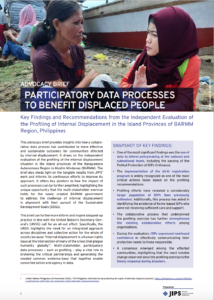 This advocacy brief provides insights into how a collaborative data process has contributed to more effective and sustainable outcomes for communities affected by internal displacement. It draws on the independent evaluation of the profiling of the internal displacement situation in the island provinces of the Bangsamoro Autonomous Region in Muslim Mindanao (BARMM). The brief also sheds light on the tangible results from JIPS’ work and informs its continuous efforts to improve its approach. It offers key pointers to how the impact of such processes can be further amplified, highlighting the unique opportunity that the multi-stakeholder exercise holds for the newly created BARMM government to address the challenge of internal displacement in alignment with their pursuit of the Sustainable Development Goals (SDGs).
This advocacy brief provides insights into how a collaborative data process has contributed to more effective and sustainable outcomes for communities affected by internal displacement. It draws on the independent evaluation of the profiling of the internal displacement situation in the island provinces of the Bangsamoro Autonomous Region in Muslim Mindanao (BARMM). The brief also sheds light on the tangible results from JIPS’ work and informs its continuous efforts to improve its approach. It offers key pointers to how the impact of such processes can be further amplified, highlighting the unique opportunity that the multi-stakeholder exercise holds for the newly created BARMM government to address the challenge of internal displacement in alignment with their pursuit of the Sustainable Development Goals (SDGs).
This brief can furthermore inform and inspire stepped-up practice in line with the United Nation’s Secretary-General’s (UNSG) call for an all-out effort. Specifically, the UNSG highlights the need for an integrated approach across disciplines and collective action for the whole of society because “internal displacement is a human rights issue at the intersection of many of the crises that plague humanity globally”. Multi-stakeholder, participatory data processes – such as profiling – play a vital role in brokering the critical partnerships and generating the needed common evidence-base that together enable concerted action and agency in data.
___
Snapshot of Key Findings
___